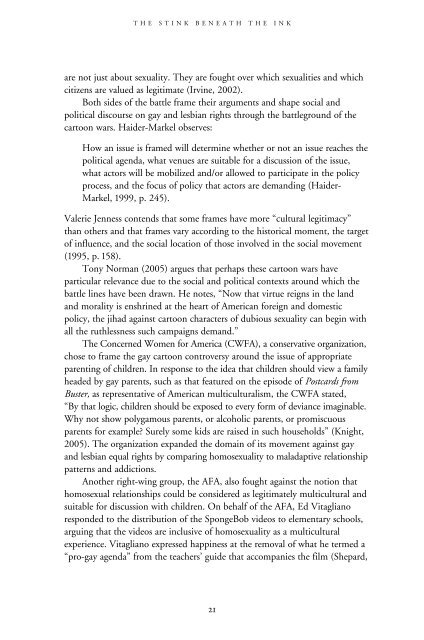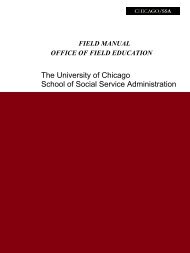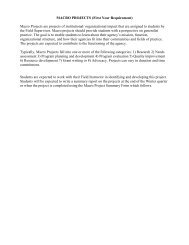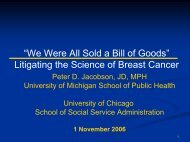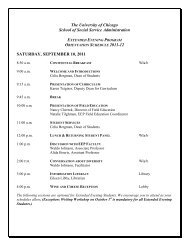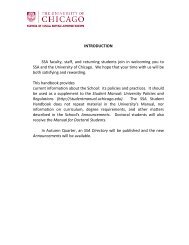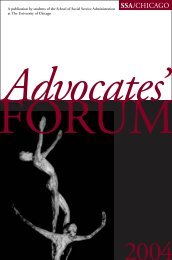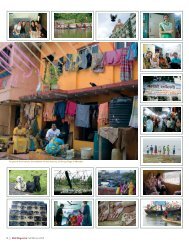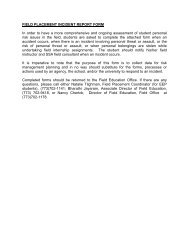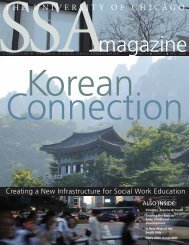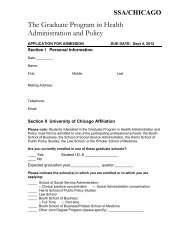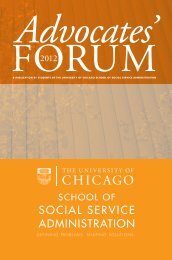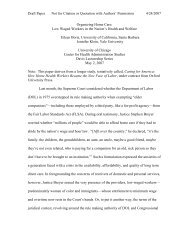2006 - School of Social Service Administration - University of Chicago
2006 - School of Social Service Administration - University of Chicago
2006 - School of Social Service Administration - University of Chicago
Create successful ePaper yourself
Turn your PDF publications into a flip-book with our unique Google optimized e-Paper software.
THE STINK BENEATH THE INK<br />
are not just about sexuality. They are fought over which sexualities and which<br />
citizens are valued as legitimate (Irvine, 2002).<br />
Both sides <strong>of</strong> the battle frame their arguments and shape social and<br />
political discourse on gay and lesbian rights through the battleground <strong>of</strong> the<br />
cartoon wars. Haider-Markel observes:<br />
How an issue is framed will determine whether or not an issue reaches the<br />
political agenda, what venues are suitable for a discussion <strong>of</strong> the issue,<br />
what actors will be mobilized and/or allowed to participate in the policy<br />
process, and the focus <strong>of</strong> policy that actors are demanding (Haider-<br />
Markel, 1999, p. 245).<br />
Valerie Jenness contends that some frames have more “cultural legitimacy”<br />
than others and that frames vary according to the historical moment, the target<br />
<strong>of</strong> influence, and the social location <strong>of</strong> those involved in the social movement<br />
(1995, p. 158).<br />
Tony Norman (2005) argues that perhaps these cartoon wars have<br />
particular relevance due to the social and political contexts around which the<br />
battle lines have been drawn. He notes, “Now that virtue reigns in the land<br />
and morality is enshrined at the heart <strong>of</strong> American foreign and domestic<br />
policy, the jihad against cartoon characters <strong>of</strong> dubious sexuality can begin with<br />
all the ruthlessness such campaigns demand.”<br />
The Concerned Women for America (CWFA), a conservative organization,<br />
chose to frame the gay cartoon controversy around the issue <strong>of</strong> appropriate<br />
parenting <strong>of</strong> children. In response to the idea that children should view a family<br />
headed by gay parents, such as that featured on the episode <strong>of</strong> Postcards from<br />
Buster, as representative <strong>of</strong> American multiculturalism, the CWFA stated,<br />
“By that logic, children should be exposed to every form <strong>of</strong> deviance imaginable.<br />
Why not show polygamous parents, or alcoholic parents, or promiscuous<br />
parents for example? Surely some kids are raised in such households” (Knight,<br />
2005). The organization expanded the domain <strong>of</strong> its movement against gay<br />
and lesbian equal rights by comparing homosexuality to maladaptive relationship<br />
patterns and addictions.<br />
Another right-wing group, the AFA, also fought against the notion that<br />
homosexual relationships could be considered as legitimately multicultural and<br />
suitable for discussion with children. On behalf <strong>of</strong> the AFA, Ed Vitagliano<br />
responded to the distribution <strong>of</strong> the SpongeBob videos to elementary schools,<br />
arguing that the videos are inclusive <strong>of</strong> homosexuality as a multicultural<br />
experience. Vitagliano expressed happiness at the removal <strong>of</strong> what he termed a<br />
“pro-gay agenda” from the teachers’ guide that accompanies the film (Shepard,<br />
21


